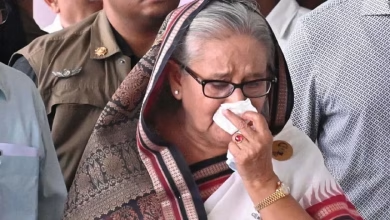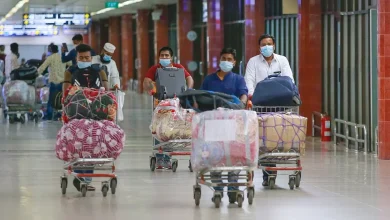Political unrest adds to war-induced slowdown in trade

The Bangladesh economy, facing persistent pressure for over three years due to the Covid-19 pandemic and the Russia-Ukraine war, has encountered a new wave of challenges.
The combination of these global events led to a dramatic rise in commodity prices and a 35% devaluation of the taka. As the economy strives to recover from this double blow, local political unrest in the form of ongoing hartals (strikes) and blockades ahead of the upcoming national elections has significantly disrupted various sectors, worsening the existing economic woes.
For example, in the port city of Chattogram, a visible manifestation of the economic slowdown is the accumulation of empty containers. The bustling activity of numerous carriers, once moving thousands of containers in and out of inland container depots (ICDs), has dwindled, reflecting the broader challenges faced by the country’s economy.
The import-export trade had already been grappling with challenges since the onset of the Russia-Ukraine war and the subsequent dollar crisis. Now, compounded by the current political turmoil, a staggering decline in export-import volumes may potentially reach up to 30%, industry leaders fear.
The ongoing hartals and blockades, enforced by opposition parties since 29 October, have particularly impacted crucial import-dependent industries. The steel industry, for instance, is in disarray, witnessing a decrease in scrap ship imports and the closure of many shipbreaking yards in recent days. Also, the cement sector has taken a hit, plummeting production by a significant 30%-40%, further adding to the challenges faced by the sector.
Merchandise export 26-month low in October
Merchandise exports hit a 26-month low in October, plummeting by 13.64% to $3.76 billion, according to data released by the Export Promotion Bureau (EPB) on 2 November.
The significant decline is in stark contrast to the $4.35 billion recorded in the same month the previous year.
Dismal export performance was extended across all major categories, encompassing ready-made garments, jute and jute goods, leather and leather goods, home textiles, and agricultural products, experiencing negative growth.
Exporters attribute this decline to subdued demand in key markets, particularly the United States and the European Union and geopolitical tensions.
Besides, ongoing labour unrest in Bangladesh’s garment manufacturing hubs, Ashulia and Gazipur regions, since 23 October, impacted the shipment of goods.
Dr Mohammad Abdur Razzaque, research director of the Policy Research Institute of Bangladesh (PRI), said, “Two major markets are in decline. The US market is not doing well and the German economy is also in a slowdown, which is reducing apparel demand in those countries.”
The ongoing political uncertainty and workers’ unrest are also likely to disrupt their supply chain, the economist added.
Disrupted transportation hurts ICD activities
Stakeholders say the disruption of transportation services caused by the ongoing political unrest, with transport owners halting operations on most days in recent weeks, has led to a significant decline in goods transportation, adversely impacting import-export activities and industrial production.
According to the Bangladesh Inland Container Depots Association (BICDA), in August 2022, 70,000 twenty-foot equivalent units (TEUs) of export cargo containers were shipped from 19 ICDs in Chattogram. However, this figure declined to 52,000 TEUs in September this year and 49,000 TEUs in October.
It is predicted that by the end of November, this quantity may further fall to 47,000-48,000 TEUs.
On the other hand, under normal circumstances, 25,000 TEUs of import containers were processed monthly, but currently it has declined to around 17,000 TEUs, indicating a reduction of 8,000 TEUs or 32% in the handling of imported goods containers.
Falling demand for shipping containers
Depot owners say the export-import container handling sector alone has seen a decline in revenues of more than Tk18 crore per month. Besides, the overall income in ICD management has fallen by about 30%. Some container depots are also facing losses.
ICD owners say prior to the onset of the Russia-Ukraine war, the ICDs maintained an average daily storage of empty containers ranging from 30,000 TEUs to a maximum of 35,000 TEUs. However, this figure has steadily risen to around 50,000 TEUs. This indicates a surge of over 30% in the volume of empty container storage, meaning the demand for shipping containers has declined which is also reflected in the income figures of the terminals.
According to the BICDA, private ICDs typically generated a monthly income of around Tk130 crore during normal circumstances. However, the current income has declined to around Tk90 crore.
BICDA General Secretary Ruhul Amin Sikder Biplob said since September of the previous year, the profit of ICDs has continued to fall, impacting the repayment of bank loans and resulting in an increase in loan amounts with interest.
Nineteen out of the 21 private ICDs in Chattogram manage both import and export containers, while the remaining two are designated for storing empty containers.
Global slowdown becomes local
Mohammed Shamsul Azam, director of the Bangladesh Knitwear Manufacturers and Exporters Association (BKMEA), said the global slowdown has resulted in a reduced demand for apparel products. Buyers have scaled back their orders, leading to a decline in the importation of raw materials and, consequently, a decrease in export volumes.
At the same time, political unrest along with the overall cooling economic conditions, has negatively affected the handling of import and export containers in ICDs.





